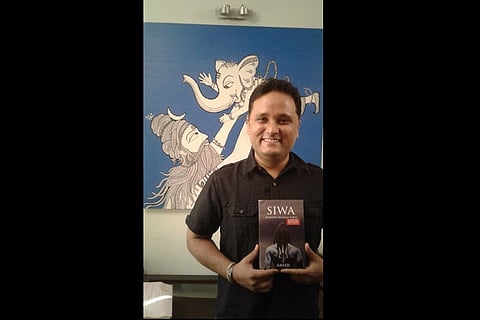

For all the fans of mythological fiction in Bengaluru, Saturday evening was a treat. Acclaimed Indian author, Amish Tripathi ("The Shiva Trilogy" and "The Ramchandra Series") who was in the city for the India Inclusion Summit, took some time off to interact with fans at The Bookworm bookshop on Church Street.
It was a packed house filled with excited and contemplative faces of all ages. Bound by their love for books, and the author alike, they came together under one roof to talk about everything from mythology to Indian culture. Answering the queries enthusiastically, Amish also talked about the Indian style of storytelling, the nuances of Hindu mythology and his upcoming books.
In an interview to The News Minute, the author further discussed his approach to mythology and god and how the audience reacts to his books.
There are thousands of characters in mythology. How do you decide which ones to adapt into your books?
I don’t actually. Fate takes a decision for me. Like with "The Ramachandra Series", it happened because of a literature festival. Someone there came to me and spoke really nasty things about Lord Ram. I got really upset and I started writing "The Ramchandra Series" the very next day. With "The Shiva Trilogy", it was more natural. It actually began as a philosophical thesis on the question ‘what is evil?’. So if you had to write a story to describe that philosophy, the best way is through the destroyer of evil himself - Lord Shiva. Also, with no disrespect to any other god, Shiva is a really cool god (laughs). So he is fun to write about.
You tend to humanise the gods from Mythology that you adapt into your books. So to what extent do you believe in the ‘magical powers’ that are attributed to god?
Amongst all the concepts of how god is perceived in the Hindu mythology, I find the concept of human beings discovering god within themselves very empowering, which is why my stories tend to emerge in this pace. The difference between those who we worship as gods and us is that we have not yet discovered the gods within and they have. But I think god does exist in all of us.
How does the older generation which usually sticks to reading the original scriptures and epics (like the "Ramayana" and the "Mahabharata") react to your books which fictionalise these epics?
In India, all of us have the right to approach god in our own way. As long as that approach is done in a respectful manner, there is nothing wrong with it. I am not a fan of those who say that the elders should change their ways. We should respect their rights and their freedom and we also have the right to approach god in our own way.
People are quite familiar with the characters of Shiva and Ram. So how do you find a new peg to them to make them more interesting?
I wish I could take credit for finding these pegs. But, honestly, I still cannot explain how it comes to me. I just open the laptop and there is this whole new parallel universe and I just record what I see. So as a writer, I discover the story as much as my readers. I don’t create it. I believe it is Lord Shiva’s blessings and I am only the channel.
Have you ever thought you would get into any controversies while writing any of your books as some are very sensitive about how the epics are adapted?
Not at all. I am not trying to be facetious here but if you want to write a story like this, there is no better country than India to do it in. You are from the media, but don’t take this the wrong way. Most of the controversies are created by the artists themselves, with their friends in the media for the sake of publicity so that they can get a flip in sales for a couple of weeks. If you avoid controversy yourself, it does not happen. I am an example of it.
Your books have been translated into many foreign languages. Why do you think your books appeal to the international audience who are not very familiar with the Indian epics?
I don’t know, honestly. I have not done many events in those places to have been able to talk to them. But I have got many positive responses. I was sent a video by my publisher of the launch of "Secret of the Nagas" in Brazil and some came dressed as Lord Shiva and Sati Maa. They also chanted "Har Har Mahadev". Another fan had actually become a Shiv bhakt! She travelled to India to meet me and visit the Jyotirlings! Most of them have been approaching Lord Shiva with a lot of devotion. Everyone will find their own way despite the culture divide. It is their right to do so.
For your fist book, you tried a lot of marketing strategies. How important are they now, after you have found footing as a popular author?
Marketing is always important. It is a fallacy to think a good book sells itself. Anything in the modern world needs to be marketed to sell, because this is such a hyper-communicative world. But in marketing it is not always about the quantum of money that you have. It is about how good the ideas are. You have to have good marketing and a good product.